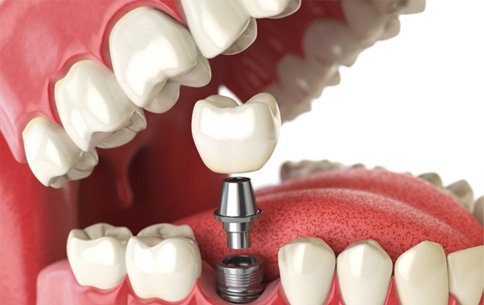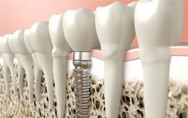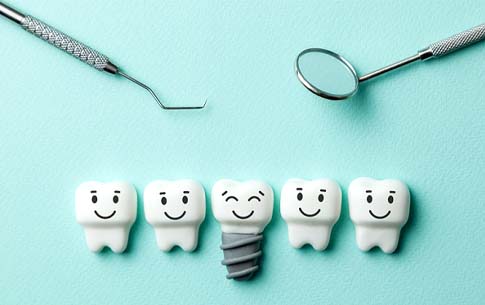Dental Implants – Conway, SC
The Most Advanced
Tooth Replacement Option
Did you know that when you lose just one tooth, your jaw bone begins to atrophy? Your body reassigns the nutrients and blood flow that used to go there to another area, leaving the jaw to slowly wither away. Consequently, other remaining teeth receive less support from the jaw bone and are at an increased risk of future loss as well. In addition, because your jaw bone becomes weaker, it can also change shape to an older, more saggy appearance. Out of the replacement options, dental implants are the only one that completely resolves this problem by stimulating the jaw bone just like a natural tooth root. Would you like to know if you qualify for this advanced treatment? Call our Conway dental office to schedule a consultation with Dr. Murph to discuss to replacement with dental implants in Conway, SC.
Why Choose American Dental Care for Dental Implants?
- Start-to-Finish Implant Care In-House
- Nitrous Oxide Sedation Offered
- Over 25 Years of Dentistry Experience and Training
The 4-Step Dental Implant Process

At American Dental Care, we don’t have to send you to another dental office at any point in the dental implant process. Dr. Murph and our team can perform every step from start to finish right here at our convenient Conway dental office. Dr. Murph has years of advanced training and can handle the placement procedure as well as any necessary preliminary procedures. Once the post has been surgically placed, we’ll wait several months for osseointegration to occur. Then, we’ll attach a connection piece called an abutment and the restoration. Read on to get a closer look at the entire dental implant process.
Initial Dental Implant Consultation

The first step is always the initial consultation with your dentist. Dr. Murph will thoroughly evaluate your oral health and smile to determine the proper way to rebuild your missing teeth. Usually, the procedure will be possible as long as you have healthy gums and sufficient jawbone tissue. However, if your oral health isn’t currently in good shape, we can perform preliminary services to address this, such as periodontal treatment, bone grafting, and even tooth extractions if necessary. Once your gums and jawbone are healthy and strong, we can move forward with your dental implant procedure.
Dental Implant Surgery

At the start of your appointment, our team will provide you with a local anesthetic to numb your mouth and keep you entirely pain-free throughout your surgery. We can even administer nitrous oxide sedation to further reduce your ability to register pain while also increasing your levels of relaxation. Then, Dr. Murph will make an incision in your gums to access the preplanned locations of your jawbone to place the dental implants. Afterward, he’ll suture the tissue closed and place protective caps atop the metal posts to keep them secure while you recover.
Dental Implant Osseointegration & Abutment

During your healing period, your dental implant will need to undergo osseointegration—the bonding process between the titanium posts and jawbone tissue. This is what will create the lifelike stability and longevity for your restorations, that way you won’t have to worry about your new pearly whites moving out of place when eating or speaking. This process can take three to six months. Once it’s complete, you’ll return to us to receive your abutment(s)—metal connector pieces that link your restorations to your implants.
Delivery of Dental Implant Restoration(s)

After your gums have healed from receiving your abutments, you’ll return to our office to have your new dental crown, bridge, or denture placed. Our team will verify that your new teeth fit correctly and that you’re satisfied with your bite. If all is well, you’ll be free to make the most out of your newly rebuilt grin.
Benefits of Dental Implants

Dental implants are highly recommended for patients with incomplete smiles. No matter how many teeth you’ve lost, dental implants can be a viable option for filling in the empty space, and they come with all kinds of important benefits. Why exactly should you choose dental implants over more traditional forms of tooth replacement? You can discover the answer to that question by taking a look at the benefits listed below.
Day-to-Day Benefits

There are several ways that dental implants can make your day-to-day life significantly better:
- Confidence: Dental implants look and feel like natural teeth. Also, unlike traditional dentures, they will never slip out of place. This means you are likely to feel a lot more confident when showing off your smile to others or eating in public.
- A More Nutritious Diet: Dental implants have enough stability to allow you to eat virtually anything you want. Without any significant limitations on your diet, it will be much easier for you to enjoy a variety of healthy foods to maintain good nutrition.
- Easy to Take Care of: There’s no need to buy any specialized products or learn a new oral hygiene routine to protect your rebuilt smile. Taking care of dental implants isn’t much different than taking care of natural teeth; you can brush and floss like you always have.
Health Benefits

Beyond the obvious advantages of letting you enjoy a complete smile again, dental implants can also be beneficial to your health:
- Prevention of Bone Loss: Did you know that the stimulation from your natural teeth prevents your jawbone from deteriorating? Since dental implants can act as new tooth roots, they can also provide this stimulation, thus helping you maintain the strength of your jaw.
- Prevention of Dental Drift: Teeth have a tendency to drift toward any open space in your smile. Dental implants can be used to completely fill in any gaps, which helps ensure that your teeth stay in the proper alignment.
- Improved Oral Health: Dental implants are relatively easy to clean, which can go a long way toward improving your overall dental hygiene and helping you keep gum disease and other oral health issues at bay.
Long-Term Benefits

Dental implants may be a significant investment in terms of time and cost, but this is balanced out by these important long-term benefits:
- A More Youthful Appearance: With dental implants preventing bone loss in your jaw, you will be less likely to experience facial collapse that can make you look older.
- Reliability: Dental implants are known for their high success rate. In fact, 95% of dental implants remain successful even a decade after their initial placement.
- Long-Lasting Results: Even well-made traditional dentures and bridges often need to be replaced every few years. By comparison, dental implants can last for well over 30 years, and you may even be able to keep them for the rest of your life provided you give them the right care and maintenance.
Who Dental Implants Can Help

One of the amazing features of dental implants is that they can be used in basically every tooth loss scenario. Whether you have lost one, several, most of, or all of your teeth, Dr. Murph can give your smile a new lease on life. However, not everyone immediately makes a good candidate. Here’s what you should know.
Who Is a Good Candidate for Dental Implants?

If you are a healthy adult, dental implants are likely a good option for you. Here are three of the things we consider when determining if you make a good candidate for the procedure:
- Good Overall Health: Placing dental implants requires a surgical procedure, so you need to be in good enough health to undergo minor surgery.
- Great Oral Health: If you have an issue like a cavity or gum disease, your dental implants are more likely to fail, so they’ll need to be addressed first.
- Adequate Jawbone Density: You need to have a strong jawbone to support dental implants for your treatment to be successful.
If you aren’t a good candidate for dental implants right away, this doesn’t always mean that they aren’t an option in the future. Many patients end up needing to complete preliminary treatments, like tooth extractions, gum disease therapy, or bone grafting before getting dental implants. We can help to schedule the preparatory procedure to get you on track towards restoring your smile. Later on, we can create your dental implant treatment plan.
Missing One Tooth

To fill in a single gap, we can use one dental implant. The post is surgically inserted into the jaw bone, where it grows and envelops the post. Once this process, called osseointegration, is finished, we’ll put a dental crown on top. Although the implant is still an artificial tooth, it comes pretty close to feeling and looking just like the real thing.
Missing Multiple Teeth

To replace more than one missing tooth, we can customize your treatment with an implant-retained bridge or implant-retained partial denture. Instead of attaching to the healthy teeth around the gaps, these restorations are anchored to two or three dental implants, providing more security.
Missing All Teeth

Losing every last tooth doesn’t mean that you can’t benefit from dental implants. Using four to six strategic implants, we can hold a full denture firmly in place. With this implant-supported option, you can enjoy a much stronger bite, allowing you to eat fibrous, nutritious foods again. (If applicable) Alternatively, you may be a candidate for All-On-4 dental implants. This method is ideal for patients who have inadequate jawbone density, possibly because they’ve been missing teeth for a long time. As the name implies, this option anchors a full denture securely in place with just four strategically placed dental implants.
Understanding the Cost of Dental Implants

Dental implants have a reputation for being expensive, but they can be relatively affordable. Many factors affect the cost of dental implants in Conway, but Dr. Tommy Murph strives to keep tooth replacement treatment in everyone’s budget. You won’t have to compromise on quality or aesthetics. Dr. Murph provides various payment solutions to fill the gaps in your smile without costing you an arm or a leg.
Preliminary Treatments & Dental Implant Surgery

The process of replacing a tooth with dental implants occurs in several steps, each with separate costs. You can pay as you go, so you don’t have to worry about paying it all at once. The amount you’ll pay is dependent on your treatment plan. Although every case differs, you can expect to pay for:
- Consultation: You’ll require an initial consultation with your implant dentist in Conway, which will include a visual examination and diagnostic services.
- Preparatory Treatments: It’s not uncommon to need a little prep work, like gum disease treatment, bone grafting, or tooth extractions.
- Placement Surgery: Sedation or anesthesia will be used to keep you comfortable as your implant posts are placed into your jaw.
The Parts of Your Dental Implant

Your estimate will also include each part of your dental implant, which includes:
- Post: A titanium post will serve as a tooth root.
- Abutment: An abutment is a fixture between the post and restoration.
- Restoration: You’ll require either a crown, bridge, or denture, depending on the number of teeth you're missing.
When choosing materials for your dental implant, focus on quality over cost. Discounted materials may not be as durable, successful, or aesthetically pleasing. As the saying goes, you’ll get what you pay for. We will help you choose the best materials for your new smile.
How Dental Implants Can Save You Money

Dental implants in Conway are the most cost-effective tooth replacement method because they never need to be replaced, unlike other prosthetics. They have over a 95% success rate and are proven to last for decades. Not to mention, they are the only treatment to preserve your jawbone, which will improve your oral health to avoid costly dental work later. As the only treatment to replace both the tooth root and the crown, you can’t put a price on the benefits you’ll gain.
Does My Dental Insurance Cover Dental Implants?

Your dental insurance may cover some of the expenses for certain steps in your treatment, like your consultation, diagnostic services, or preparatory procedures. After meeting your deductible, your insurance may pay some of the cost of your restoration. We will work on your behalf with your dental insurance to maximize your coverage to lower the amount you’ll pay out-of-pocket.
Making Dental Implants Affordable

Besides using your dental insurance, our office offers multiple options to keep dental implants affordable, like:
- Traditional Payments: We accept cash, credit cards, and personal checks for your convenience.
- Financing: You can pay for your new smile using monthly installments through a third-party financing company, like CareCredit.
Maintaining & Caring for Your Dental Implants

Dental implants are quickly becoming the treatment of choice for most patients – and for good reason. It’s the only tooth-replacement solution capable of keeping your smile complete, strong, and healthy for a lifetime. Of course, that’s only the case if you take proper care of your newly rebuilt grin. At American Dental Care, we want your dental implants to last as long as possible, which is why we’ve compiled a list of ways you can properly care for them. To learn more, continue reading or give our office a call today!
Make Oral Hygiene a Priority

Practicing good oral hygiene is always important, whether you have dental implants or not. If you fail to take proper care of your teeth and gums, harmful bacteria can attack your soft oral tissues, potentially causing bone and tooth loss. Additionally, you could develop decay on your natural teeth. Brushing twice a day, flossing daily, and rinsing daily with an ADA-approved mouthwash are excellent practices that will help keep your smile in optimal condition.
Stick to a Healthy Diet

Once fully healed, you can eat almost any food you want with dental implants! However, be sure to avoid overindulging in hard, sticky, sugary, or acidic foods. They can wreak havoc on your brand-new grin and contribute to multiple oral health issues. Instead, you should eat nutrient-rich foods that will benefit your jawbone and gums, such as fresh fruits, vegetables, whole grains, lean proteins, and dairy products.
Break Bad Habits

Poor habits like smoking, biting your fingernails, using your teeth as tools, and chewing on pens or pencils can be detrimental to your implants. To keep your smile safe, consider kicking these habits to the curb as soon as you can. If you need help breaking them, reach out to Dr. Murph for assistance. He can provide you with the resources, support, and guidance you need to make the feat as easy as can be.
Protect Your Dental Implants

Do you regularly play sports or grind your teeth at night? If so, ask Dr. Murph about a custom-made oral device. An athletic mouthguard can keep your mouth safe against any impact should you sustain a blow to the face. Meanwhile, a nightguard will protect your enamel from the force of you grinding your teeth at night.
Schedule Regular Dental Checkups

It’s incredibly important that you visit Dr. Murph every six months for a checkup and cleaning to keep your smile in excellent condition. He’ll conduct an oral examination, review your prosthetics, and monitor your implants to ensure no problems are developing. With his help, you can address issues early on and avoid needing more complex, expensive treatments down the line.
Dental Implant FAQs

Dental implants are a preferred tooth replacement option because of their numerous benefits, but they are quite an investment, so it pays to be well-informed. Here are the answers to some of the most common queries we receive about dental implants in Conway. If you don’t see the information that you’re looking for below, just give us a call ! Our team would be more than happy to answer your questions and get you started with an initial consultation.
How Long Do Dental Implants Last?
The lifespan of dental implants depends on the health and lifestyle choices of the patient. To ensure that implants last, be sure to brush, floss, and rinse with a mouthwash on a daily basis. Attend dental checkups and cleanings regularly. Remember to avoid chewing on anything particularly hard or sticky and using your teeth to open packaging. With proper maintenance, dental implants can last upwards of 30 years. This is several times longer than traditional bridges and dentures.
Does Getting Dental Implants Hurt?
Your jawbone doesn’t have many nerve endings, and your mouth will be numbed with a local anesthetic before the procedure begins. You will also most likely be sedated, lowering your ability to register pain. While the surgery shouldn’t hurt, your mouth may be sore for a few days afterwards. Remember to take recommended over the counter and prescribed pain relievers as directed. Cold compresses can also help. If discomfort worsens instead of improving after two or three days, give us a call!
Are Dental Implants Safe?
For most patients with good health, dental implants are very successful when placed by a qualified professional. If you have low jawbone density or gum disease, these issues will need to be eliminated to make dental implant surgery safer and more successful. If you have diabetes, cancer, or other medical conditions that could make surgery or the healing process risky, we can discuss these during your consultation.
Will I Have to Take Off Work for Dental Implant Surgery?
Most patients only need to take one or two days off to get dental implants. If your job is physically demanding, you may want to take at least three to four, as heavy exercise can divert blood from the implant site and delay healing. Every case is different, so Dr. Murph will be able to give you a more specific recommendation during your consultation.

